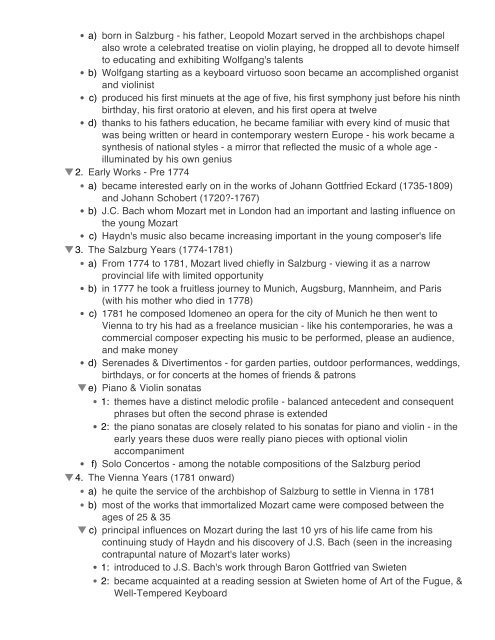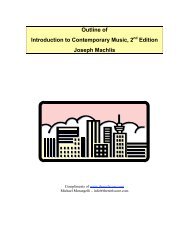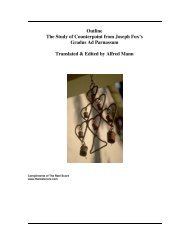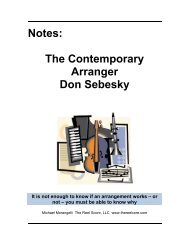An Outline of The History of Western Music Grout ... - The Reel Score
An Outline of The History of Western Music Grout ... - The Reel Score
An Outline of The History of Western Music Grout ... - The Reel Score
You also want an ePaper? Increase the reach of your titles
YUMPU automatically turns print PDFs into web optimized ePapers that Google loves.
a) born in Salzburg - his father, Leopold Mozart served in the archbishops chapel<br />
also wrote a celebrated treatise on violin playing, he dropped all to devote himself<br />
to educating and exhibiting Wolfgang's talents<br />
b) Wolfgang starting as a keyboard virtuoso soon became an accomplished organist<br />
and violinist<br />
c) produced his first minuets at the age <strong>of</strong> five, his first symphony just before his ninth<br />
birthday, his first oratorio at eleven, and his first opera at twelve<br />
d) thanks to his fathers education, he became familiar with every kind <strong>of</strong> music that<br />
was being written or heard in contemporary western Europe - his work became a<br />
synthesis <strong>of</strong> national styles - a mirror that reflected the music <strong>of</strong> a whole age -<br />
illuminated by his own genius<br />
2. Early Works - Pre 1774<br />
a) became interested early on in the works <strong>of</strong> Johann Gottfried Eckard (1735-1809)<br />
and Johann Schobert (1720?-1767)<br />
b) J.C. Bach whom Mozart met in London had an important and lasting influence on<br />
the young Mozart<br />
c) Haydn's music also became increasing important in the young composer's life<br />
3. <strong>The</strong> Salzburg Years (1774-1781)<br />
a) From 1774 to 1781, Mozart lived chiefly in Salzburg - viewing it as a narrow<br />
provincial life with limited opportunity<br />
b) in 1777 he took a fruitless journey to Munich, Augsburg, Mannheim, and Paris<br />
(with his mother who died in 1778)<br />
c) 1781 he composed Idomeneo an opera for the city <strong>of</strong> Munich he then went to<br />
Vienna to try his had as a freelance musician - like his contemporaries, he was a<br />
commercial composer expecting his music to be performed, please an audience,<br />
and make money<br />
d) Serenades & Divertimentos - for garden parties, outdoor performances, weddings,<br />
birthdays, or for concerts at the homes <strong>of</strong> friends & patrons<br />
e) Piano & Violin sonatas<br />
1: themes have a distinct melodic pr<strong>of</strong>ile - balanced antecedent and consequent<br />
phrases but <strong>of</strong>ten the second phrase is extended<br />
2: the piano sonatas are closely related to his sonatas for piano and violin - in the<br />
early years these duos were really piano pieces with optional violin<br />
accompaniment<br />
f) Solo Concertos - among the notable compositions <strong>of</strong> the Salzburg period<br />
4. <strong>The</strong> Vienna Years (1781 onward)<br />
a) he quite the service <strong>of</strong> the archbishop <strong>of</strong> Salzburg to settle in Vienna in 1781<br />
b) most <strong>of</strong> the works that immortalized Mozart came were composed between the<br />
ages <strong>of</strong> 25 & 35<br />
c) principal influences on Mozart during the last 10 yrs <strong>of</strong> his life came from his<br />
continuing study <strong>of</strong> Haydn and his discovery <strong>of</strong> J.S. Bach (seen in the increasing<br />
contrapuntal nature <strong>of</strong> Mozart's later works)<br />
1: introduced to J.S. Bach's work through Baron Gottfried van Swieten<br />
2: became acquainted at a reading session at Swieten home <strong>of</strong> Art <strong>of</strong> the Fugue, &<br />
Well-Tempered Keyboard<br />
d) piano works - most important <strong>of</strong> Vienna period are the Fantasia & Sonata in C<br />
minor





